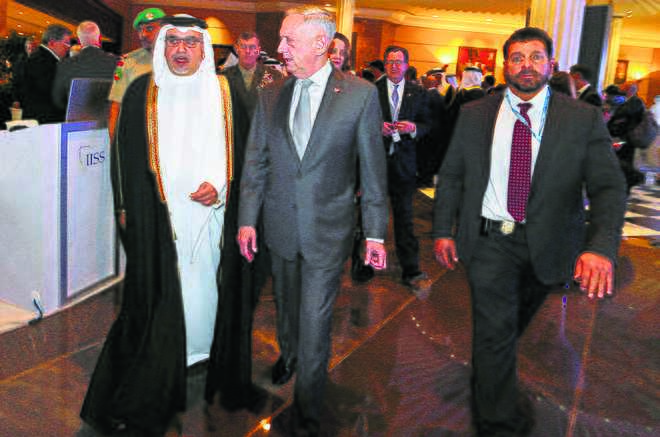India’s diplomatic misstep
KP Nayar
Senior Journalist
INDIA has a serious Syria problem. It is nothing like Russia’s Syria problem. Or Israel’s Syria problem. Or for that matter America’s or Saudi Arabia’s. India’s problem is of its own making. But it has ramifications which go beyond the Levant that are being felt as far away as Francophone Africa and the Lusophone Commonwealth. The solution to the problem lies in Damascus with President Bashar al-Assad.
But without a credible solution, New Delhi runs the risk of being on the margins in what has become the strategic epicentre of West Asia’s evolving geo-strategy. India also runs the risk of losing face in Equatorial Guinea, which the Modi government has been looking at as a new frontier because its oil and gas-fuelled economy has created the highest income per capita in sub-Saharan Africa.
The origins of India’s current Syria problem go back to November last year when ambassador Man Mohan Bhanot completed his two-year tenure in Damascus, a hardship posting. Because it is a non-family station, diplomats from all countries try to get out of Syria as soon as their tenure is up.
Earlier this year, the Modi government decided to open an embassy in Equatorial Guinea and five months ago proposed Bhanot as its first Ambassador resident in Malabo, the capital. President Teodoro Obiang Nguema Mbasogo approved the nomination, and on August 3 it was announced that Bhanot would leave Damascus. (At the time of writing, he is still stuck in Syria.)
The search for a new ambassador began a year and half ago when Bhanot was approaching the end of his posting. But no IFS officer was ready to go there. The vacancy was twice circulated by South Block, the seat of the MEA, but to no avail. Since neither cajoling nor commanding would get any officer to pack his/her bags, South Block opted for an Arabic interpreter to be its next ambassador. It chose a non-IFS officer belonging to MEA’s interpreter cadre, who was just about finishing his tenure in Saudi Arabia. When the new name was sent to the Syrian government for agrément (host government agrees to receive the credentials of an ambassador posted to that country and permits him to fulfil diplomatic functions), its ministry of foreign affairs and expatriates was deeply upset.
For decades, India had sent some of its finest diplomats to head the Indian Mission, men who have risen to be Foreign Secretaries or those who have later handled tricky diplomatic tasks with aplomb. Notwithstanding the civil war, South Block’s policy brief continues to mention Syria’s ‘experience of being secular, nationalist and development-oriented’ as the rationale for maintaining robust ties.
As per sources in Damascus, given the nature of Syria’s politics, the ministry brought the proposed envoy’s nomination to the attention of President Assad, pointing out that posting an interpreter was tantamount to downgrading relations. The ministry recommended that agrément should be refused. Assad values ties with India, which flourished under his late father, Hafez al-Assad, who was a political colossus in the Arab world for three decades from the start of the 1970s. Assad needs India more than India needs him or Syria. So an interpretor cadre officer may eventually take up his post, but the damage is done.
Syria was the dominant theme at this year’s Manama Dialogue in Bahrain (October 26-28), attended by kings, presidents, PMs and top strategic functionaries such as US Defence Secretary James Mattis. Speaker after speaker conceded, especially during closed-door sessions, that the last chapter in the conflict was being written and that Assad would only consolidate his hold on his country.
Any shadow over bilateral relations at this critical time will marginalise India from the most important events in West Asia since the Arab Spring. Assad is one head of state India can count on at summits of Islamic or Arab leaders to speak up for India’s policies, be it Kashmir or religious freedom and on secularism which guarantees the rights of Indian Muslims.
At the dialogue, a vital forum for policy makers from the Middle East and beyond to find ways to address the region’s challenges, there was much talk of readmitting Syria into the Arab League. Though there is no concrete proposal yet, the writing on the wall is clear. Russia and Iran, not acting in concert, have ensured that Assad is there to stay. In which case, India ought to upgrade its ties.
The importance of Syria is not just diplomatic in content. Religious tourism to Syria by Indian Shia Muslims represents a little known, yet an enduring strand of people-to-people relations between the two countries. Even in the first year of the Arab Spring, for which figures are available in Damascus, 37,000 Indians, mostly from UP and Andhra Pradesh, visited holy sites in Syria.
An end to the civil war will trigger a rush of Indian pilgrims. This requires an efficient Indian embassy to cope with the challenges posed by an increase in religious tourism. Damascus is to many Christians in Kerala what the Vatican is to Catholics all over the world: this chunk of Malayali Christians owe allegiance to the Orthodox Church of Antioch, tracing its origins to apostles Saint Peter and Saint Paul. They use Syriac as their language of liturgy. Syriac is to Syrians what Sanskrit is to Indians.
A resumption of religious tourism to the patriarch of this Orthodox Church in Damascus can also be expected once peace returns to Syria which will be sooner than later. South Block, therefore, needs to be proactive and not reactive when the absence of professional diplomats at its embassy creates any crisis it did not prepare for.










